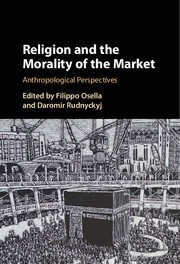Book contents
- Frontmatter
- Dedication
- Contents
- List of Figures
- List of Contributors
- Acknowledgments
- Introduction: Assembling Market and Religious Moralities
- 1 Risk, Fate, Fortune: The Lives and Times of Customs Inspectors in Southern China
- 2 Morality, Markets, and the Gospel of Prosperity
- 3 Religious Myths Retold: Masters and Servants in India's Corporate Culture
- 4 Divine Markets: Ethnographic Notes on Postnationalism and Moral Consumption in India
- 5 Merit Economies in Neoliberal Times: Halal Troubles in Contemporary Sri Lanka
- 6 “Structural Adjustment Islam” and the Religious Economy in Neoliberal Mali
- 7 Assembling Islam and Liberalism: Market Freedom and the Moral Project of Islamic Finance
- 8 Persistent Forms: Catholic Charity Homes and the Limits of Neoliberal Morality
- 9 Marketizing Piety through Charitable Work: Islamic Charities and the Islamization of Middle- Class Families in Indonesia
- 10 “A Poor Muslim Cannot Be a Good Muslim”: Islam, Charitable Giving, and Market Logic in Sri Lanka
- 11 “For God and the Country”: Agricultural Migrations and their Moralities in South India
- 12 “The Globalization of Indifference”: On Pope Francis, Migration and Global Acedia
- Index
- References
2 - Morality, Markets, and the Gospel of Prosperity
Published online by Cambridge University Press: 13 April 2017
- Frontmatter
- Dedication
- Contents
- List of Figures
- List of Contributors
- Acknowledgments
- Introduction: Assembling Market and Religious Moralities
- 1 Risk, Fate, Fortune: The Lives and Times of Customs Inspectors in Southern China
- 2 Morality, Markets, and the Gospel of Prosperity
- 3 Religious Myths Retold: Masters and Servants in India's Corporate Culture
- 4 Divine Markets: Ethnographic Notes on Postnationalism and Moral Consumption in India
- 5 Merit Economies in Neoliberal Times: Halal Troubles in Contemporary Sri Lanka
- 6 “Structural Adjustment Islam” and the Religious Economy in Neoliberal Mali
- 7 Assembling Islam and Liberalism: Market Freedom and the Moral Project of Islamic Finance
- 8 Persistent Forms: Catholic Charity Homes and the Limits of Neoliberal Morality
- 9 Marketizing Piety through Charitable Work: Islamic Charities and the Islamization of Middle- Class Families in Indonesia
- 10 “A Poor Muslim Cannot Be a Good Muslim”: Islam, Charitable Giving, and Market Logic in Sri Lanka
- 11 “For God and the Country”: Agricultural Migrations and their Moralities in South India
- 12 “The Globalization of Indifference”: On Pope Francis, Migration and Global Acedia
- Index
- References
Summary
If you walk into any airport bookstore in Europe or North America and head for the section selling advice on how to succeed in business, in relationships, or simply in life there is a good chance that you will find books by Joel Osteen. His bestsellers include Become a Better You: 7 Keys to Improving Your Life Every Day (2009) and Making Wise Choices: Your Decisions Determine Your Destiny (2005). But Osteen is not just a successful author of self-help books; he is also a televangelist renowned in charismatic circles around the world for his prosperity message and for being the head pastor of Lakewood Church in Houston, Texas. His father, John, founded Lakewood Church in the late 1950s and in the process shifted theological positions away from southern Baptism toward a more charismatic, Pentecostal orientation. Arguably, though, Joel has made a still more significant transition in his career, and one that is rarely achieved even in the noisy, confident world of contemporary American televangelists and prosperity preachers. For he has reached a stage at which he not only holds the interest of self-confessed believers – and there are quite a few of those, as Osteen's services are beamed out from Houston to some 100 countries each week – but has also visibly penetrated a global, secular market such as that represented by airport bookstores, which must appeal to generic rather than specifically Christian tastes. Osteen now inhabits a similar niche to that which Norman Vincent Peale made his own in the middle of the twentieth century by offering variations on a theme of positive thinking. He was featured as one of ABC News's “Most Fascinating People of 2006,” and he has had the dubious pleasure of being interviewed on CNN by Piers Morgan. Presidential candidate John McCain called him “inspiring.” In sum, his appeal goes far beyond religion.
When I see Joel Osteen's books for sale at airports I often think back to the first interview my colleague Katrin Maier and I did with a member of the Redeemed Christian Church of God in London (RCCG).
- Type
- Chapter
- Information
- Religion and the Morality of the Market , pp. 50 - 71Publisher: Cambridge University PressPrint publication year: 2017



